[英语]城市化的影响
- 格式:docx
- 大小:9.94 KB
- 文档页数:2
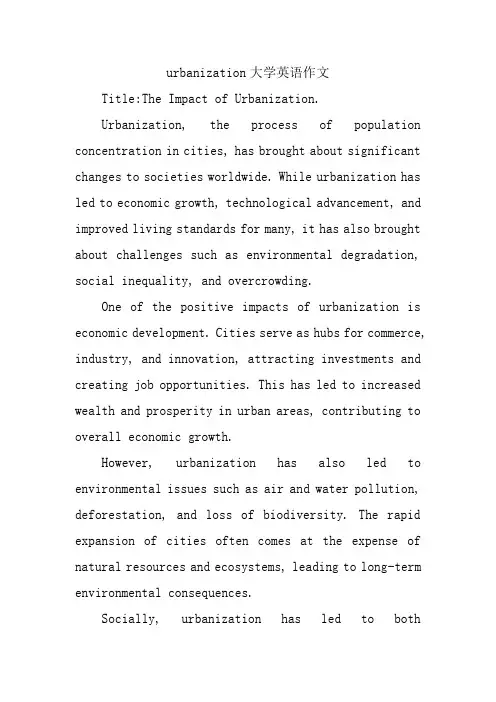
urbanization大学英语作文Title:The Impact of Urbanization.Urbanization, the process of population concentration in cities, has brought about significant changes to societies worldwide. While urbanization has led to economic growth, technological advancement, and improved living standards for many, it has also brought about challenges such as environmental degradation, social inequality, and overcrowding.One of the positive impacts of urbanization is economic development. Cities serve as hubs for commerce, industry, and innovation, attracting investments and creating job opportunities. This has led to increased wealth and prosperity in urban areas, contributing to overall economic growth.However, urbanization has also led to environmental issues such as air and water pollution, deforestation, and loss of biodiversity. The rapid expansion of cities often comes at the expense of natural resources and ecosystems, leading to long-term environmental consequences.Socially, urbanization has led to bothopportunities and challenges. While cities offer cultural diversity, education, and healthcare opportunities, they also face issues such as poverty, crime, and social inequality. The concentration of wealth and resources in urban areas has led to disparities in access to basic services and opportunities, widening the gap between the rich and the poor.In conclusion, urbanization has had a profound impact on societies, bringing both opportunities and challenges. It is essential for policymakers to address the negative consequences of urbanization, such as environmental degradation and social inequality, while harnessing the benefits of economic development and innovation that cities offer.标题:城市化的影响。
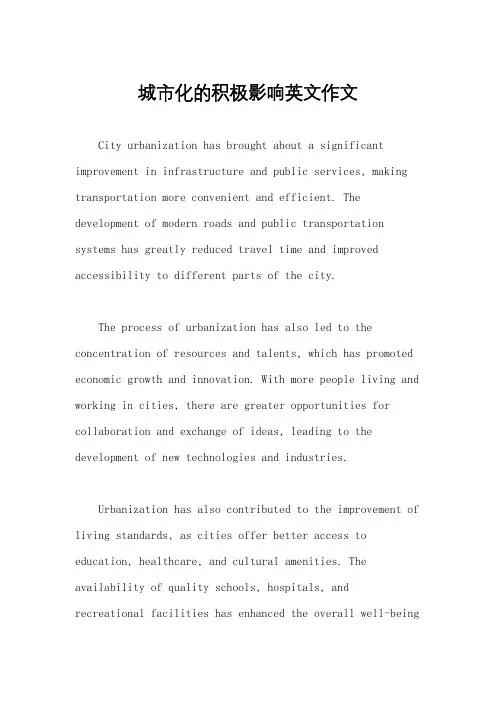
城市化的积极影响英文作文City urbanization has brought about a significant improvement in infrastructure and public services, making transportation more convenient and efficient. The development of modern roads and public transportation systems has greatly reduced travel time and improved accessibility to different parts of the city.The process of urbanization has also led to the concentration of resources and talents, which has promoted economic growth and innovation. With more people living and working in cities, there are greater opportunities for collaboration and exchange of ideas, leading to the development of new technologies and industries.Urbanization has also contributed to the improvement of living standards, as cities offer better access to education, healthcare, and cultural amenities. The availability of quality schools, hospitals, andrecreational facilities has enhanced the overall well-beingof urban residents.Furthermore, the diversity and multiculturalism that come with urbanization have enriched the social fabric of cities, creating a vibrant and dynamic environment. People from different backgrounds and cultures bring their unique perspectives and experiences, fostering a more inclusive and tolerant society.In addition, the growth of urban areas has led to the conservation of natural habitats and resources in rural areas, as it reduces the need for extensive land development and exploitation. This helps to preserve the environment and protect biodiversity.Overall, the process of urbanization has had a positive impact on society, contributing to economic development, social progress, and environmental sustainability. It has transformed cities into hubs of opportunity, diversity, and creativity, making them vital centers of modern life.。
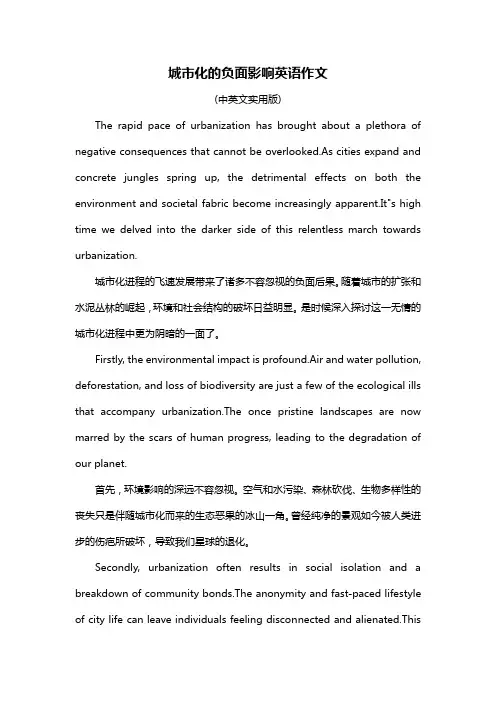
城市化的负面影响英语作文(中英文实用版)The rapid pace of urbanization has brought about a plethora of negative consequences that cannot be overlooked.As cities expand and concrete jungles spring up, the detrimental effects on both the environment and societal fabric become increasingly apparent.It"s high time we delved into the darker side of this relentless march towards urbanization.城市化进程的飞速发展带来了诸多不容忽视的负面后果。
随着城市的扩张和水泥丛林的崛起,环境和社会结构的破坏日益明显。
是时候深入探讨这一无情的城市化进程中更为阴暗的一面了。
Firstly, the environmental impact is profound.Air and water pollution, deforestation, and loss of biodiversity are just a few of the ecological ills that accompany urbanization.The once pristine landscapes are now marred by the scars of human progress, leading to the degradation of our planet.首先,环境影响的深远不容忽视。
空气和水污染、森林砍伐、生物多样性的丧失只是伴随城市化而来的生态恶果的冰山一角。
曾经纯净的景观如今被人类进步的伤疤所破坏,导致我们星球的退化。
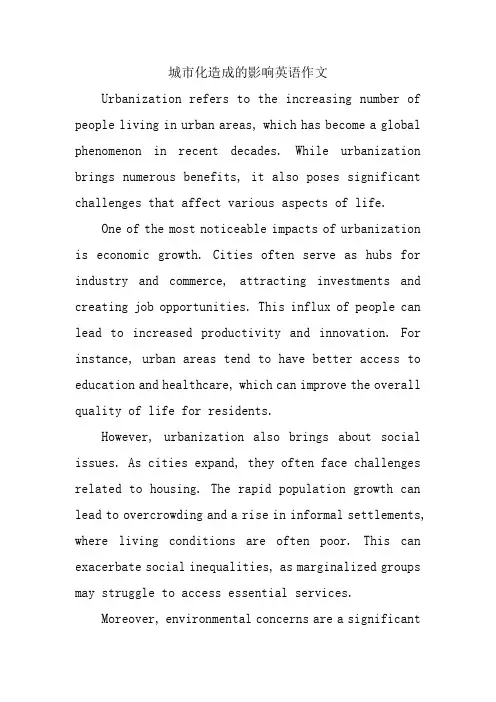
城市化造成的影响英语作文Urbanization refers to the increasing number of people living in urban areas, which has become a global phenomenon in recent decades. While urbanization brings numerous benefits, it also poses significant challenges that affect various aspects of life.One of the most noticeable impacts of urbanization is economic growth. Cities often serve as hubs for industry and commerce, attracting investments and creating job opportunities. This influx of people can lead to increased productivity and innovation. For instance, urban areas tend to have better access to education and healthcare, which can improve the overall quality of life for residents.However, urbanization also brings about social issues. As cities expand, they often face challenges related to housing. The rapid population growth can lead to overcrowding and a rise in informal settlements, where living conditions are often poor. This can exacerbate social inequalities, as marginalized groups may struggle to access essential services.Moreover, environmental concerns are a significantconsequence of urbanization. Increased urban populations lead to higher demand for resources such as water and energy, contributing to pollution and environmental degradation. Traffic congestion and waste management become critical issues that cities must address to maintain a sustainable environment.In conclusion, urbanization has both positive and negative impacts. While it can drive economic growth and enhance living standards, it also presents challenges like social inequality and environmental degradation. To harness the benefits of urbanization while mitigating its drawbacks, careful planning and sustainable practices are essential.中文翻译:城市化指的是生活在城市地区的人数不断增加,这在近几十年来已成为一种全球现象。

城市化对人们生活的影响英文作文Urbanization, a complex social phenomenon, has profound impacts on people's lives. As cities expand and populations migrate from rural areas, urban landscapes are transformed, bringing both positive and negative consequences.城市化是一个复杂的社会现象,对人们的生活产生了深远的影响。
随着城市的扩张和人口从农村地区的迁移,城市景观发生了变化,带来了积极和消极的后果。
On the positive side, urbanization offers numerous opportunities for individuals. Jobs become more plentiful as cities attract businesses and industries. Educational resources improve, providing access to higher education and specialized training. Infrastructure such as transportation, healthcare, and entertainment facilities also expand, enhancing the quality of life for urban residents.在积极方面,城市化为个人提供了众多机会。
城市吸引了商业和工业,使得就业机会更加丰富。
教育资源得到改善,为人们提供了接受高等教育和专门培训的机会。
此外,交通、医疗和娱乐设施等基础设施也得到了扩展,提高了城市居民的生活质量。
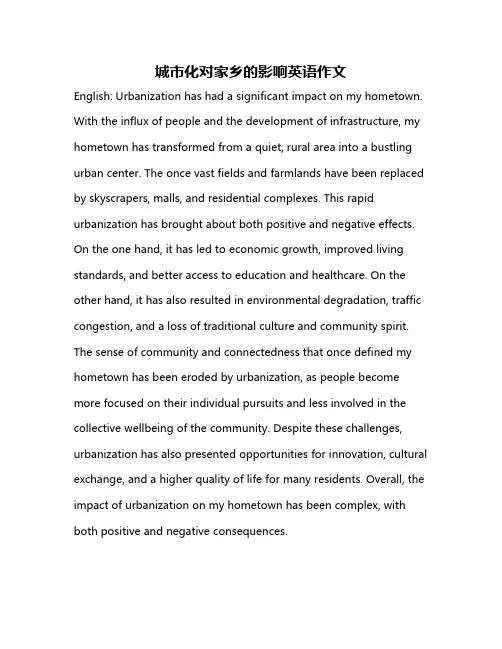
城市化对家乡的影响英语作文English: Urbanization has had a significant impact on my hometown. With the influx of people and the development of infrastructure, my hometown has transformed from a quiet, rural area into a bustling urban center. The once vast fields and farmlands have been replaced by skyscrapers, malls, and residential complexes. This rapid urbanization has brought about both positive and negative effects. On the one hand, it has led to economic growth, improved living standards, and better access to education and healthcare. On the other hand, it has also resulted in environmental degradation, traffic congestion, and a loss of traditional culture and community spirit. The sense of community and connectedness that once defined my hometown has been eroded by urbanization, as people become more focused on their individual pursuits and less involved in the collective wellbeing of the community. Despite these challenges, urbanization has also presented opportunities for innovation, cultural exchange, and a higher quality of life for many residents. Overall, the impact of urbanization on my hometown has been complex, with both positive and negative consequences.中文翻译: 城市化对我的家乡产生了重大影响。
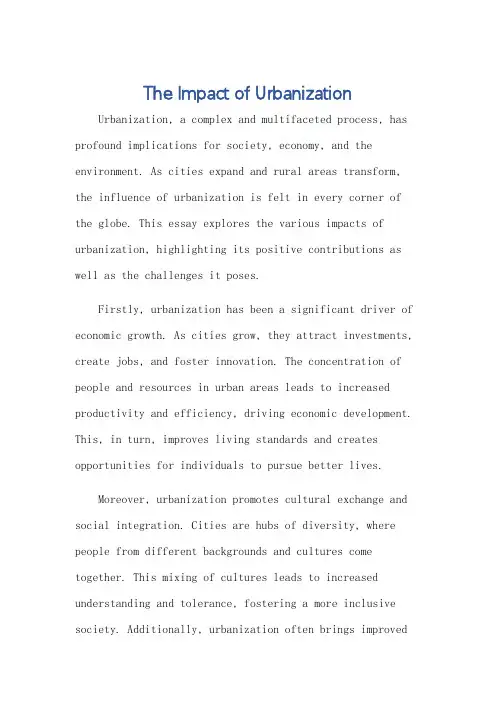
The Impact of UrbanizationUrbanization, a complex and multifaceted process, has profound implications for society, economy, and the environment. As cities expand and rural areas transform, the influence of urbanization is felt in every corner of the globe. This essay explores the various impacts of urbanization, highlighting its positive contributions as well as the challenges it poses.Firstly, urbanization has been a significant driver of economic growth. As cities grow, they attract investments, create jobs, and foster innovation. The concentration of people and resources in urban areas leads to increased productivity and efficiency, driving economic development. This, in turn, improves living standards and creates opportunities for individuals to pursue better lives.Moreover, urbanization promotes cultural exchange and social integration. Cities are hubs of diversity, where people from different backgrounds and cultures come together. This mixing of cultures leads to increased understanding and tolerance, fostering a more inclusive society. Additionally, urbanization often brings improvedaccess to education, healthcare, and other social services, enhancing the overall well-being of urban residents.However, the impact of urbanization is not all positive. The rapid expansion of cities often leads to environmental degradation. Urban areas are often hotspots for pollution, with increased levels of air and water pollution due to industrialization, transportation, and waste disposal. This degradation has negative consequences for human health and the ecosystem.Furthermore, urbanization can also lead to social disparities and inequality. The influx of people intocities often outpaces the provision of basic services and infrastructure, resulting in overcrowding, poor housing conditions, and inadequate access to resources. This can create a divide between the urban poor and the moreaffluent urbanites, perpetuating social inequality.To mitigate the negative impacts of urbanization, it is crucial to adopt a sustainable approach to urban development. This includes investing in clean energy and green infrastructure, promoting environmental protection measures, and ensuring inclusive growth that benefits allurban residents. Additionally, policies should be designedto address social disparities, ensuring that the benefitsof urbanization are shared evenly.In conclusion, urbanization is a complex process that brings both opportunities and challenges. While it drives economic growth and cultural exchange, it also poses environmental and social challenges. It is essential to approach urbanization with a sustainable mindset,prioritizing environmental protection, social inclusivity, and the overall well-being of urban residents. By doing so, we can harness the positive impacts of urbanization while minimizing its negative consequences.**城镇化的影响**城镇化是一个复杂且多面的过程,对社会、经济和环境产生深远的影响。

家乡城市化的影响英语作文Urbanization has brought both positive and negative impacts on my hometown.On the positive side, urbanization has led to improved infrastructure in my hometown. New roads, bridges, andpublic transportation systems have been developed, makingit easier for people to travel around the city. In addition, urbanization has brought better access to healthcare, education, and other essential services. The growth of industries and businesses in urban areas has also created more job opportunities for the local residents.However, urbanization has also brought some negative consequences to my hometown. One of the major issues is the increasing environmental pollution. The rapid urbanization has led to the depletion of natural resources, deforestation, and increased air and water pollution. This has resulted in health problems for the residents and has also affected the local ecosystem. Another downside of urbanization is the rise in housing prices and cost of living. As more people migrate to urban areas, the demandfor housing has increased, leading to inflated prices andmaking it difficult for low-income families to afford decent housing.Overall, while urbanization has brought development and economic growth to my hometown, it has also posed challenges in terms of environmental sustainability, social inequality, and quality of life for the residents.城市化对我家乡产生了积极和消极的影响。
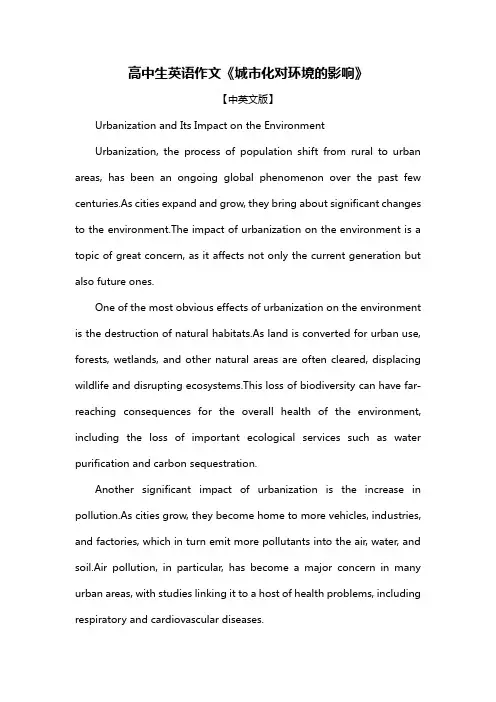
高中生英语作文《城市化对环境的影响》【中英文版】Urbanization and Its Impact on the EnvironmentUrbanization, the process of population shift from rural to urban areas, has been an ongoing global phenomenon over the past few centuries.As cities expand and grow, they bring about significant changes to the environment.The impact of urbanization on the environment is a topic of great concern, as it affects not only the current generation but also future ones.One of the most obvious effects of urbanization on the environment is the destruction of natural habitats.As land is converted for urban use, forests, wetlands, and other natural areas are often cleared, displacing wildlife and disrupting ecosystems.This loss of biodiversity can have far-reaching consequences for the overall health of the environment, including the loss of important ecological services such as water purification and carbon sequestration.Another significant impact of urbanization is the increase in pollution.As cities grow, they become home to more vehicles, industries, and factories, which in turn emit more pollutants into the air, water, and soil.Air pollution, in particular, has become a major concern in many urban areas, with studies linking it to a host of health problems, including respiratory and cardiovascular diseases.Urbanization also leads to increased consumption of resources.As people move to cities, their lifestyle often becomes more consume-oriented, leading to higher demand for energy, water, food, and other resources.This increased consumption puts a strain on the environment, as it often leads to overexploitation of natural resources and increased waste generation.Furthermore, urbanization contributes to climate change.The concentration of people and infrastructure in cities leads to increased energy consumption, which in turn contributes to greenhouse gas emissions.Additionally, urban areas often have less green space, which means they have less capacity to absorb and store carbon dioxide, a major greenhouse gas.In conclusion, urbanization has a significant impact on the environment, affecting natural habitats, increasing pollution, and contributing to climate change.It is crucial that we find ways to manage urbanization in a sustainable manner, incorporating green spaces, promoting public transportation, and adopting environmentally friendly practices.Only through such measures can we hope to mitigate the negative environmental impacts of urbanization and create cities that are healthy and sustainable for current and future generations.。
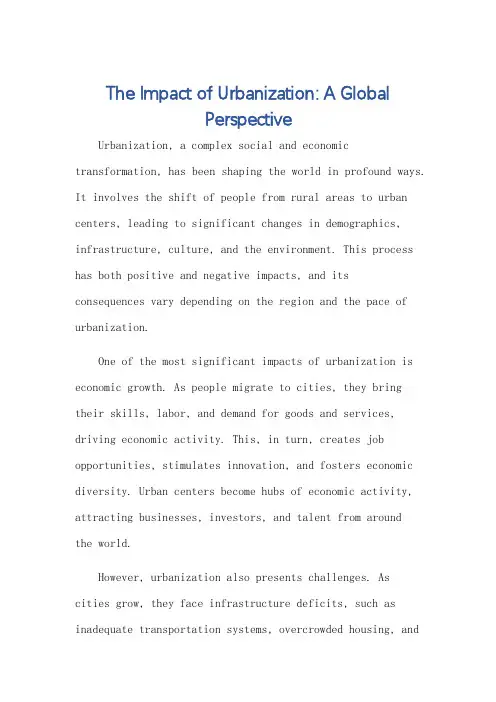
The Impact of Urbanization: A GlobalPerspectiveUrbanization, a complex social and economic transformation, has been shaping the world in profound ways. It involves the shift of people from rural areas to urban centers, leading to significant changes in demographics, infrastructure, culture, and the environment. This process has both positive and negative impacts, and its consequences vary depending on the region and the pace of urbanization.One of the most significant impacts of urbanization is economic growth. As people migrate to cities, they bring their skills, labor, and demand for goods and services, driving economic activity. This, in turn, creates job opportunities, stimulates innovation, and fosters economic diversity. Urban centers become hubs of economic activity, attracting businesses, investors, and talent from aroundthe world.However, urbanization also presents challenges. Ascities grow, they face infrastructure deficits, such as inadequate transportation systems, overcrowded housing, andlimited access to basic services like water and sanitation. These issues can lead to congestion, pollution, and social disparities, affecting the quality of life for urban residents.Moreover, urbanization can have environmental impacts. The rapid expansion of cities often comes at the cost of natural habitats, leading to deforestation, soil erosion, and loss of biodiversity. Urban areas also contribute significantly to climate change through greenhouse gas emissions from transportation, industry, and energy production.Cultural impacts of urbanization are also noteworthy. As rural communities shrink and urban centers grow, traditional cultures and values may be diluted or lost. This can lead to the homogenization of urban landscapes and a loss of cultural diversity, affecting the identity and heritage of communities.Nevertheless, urbanization also offers opportunitiesfor positive transformation. It can lead to the development of more inclusive and sustainable cities, where residents enjoy better access to education, healthcare, and otherbasic services. Urbanization can also foster cultural exchange and innovation, promoting creativity and entrepreneurship.In conclusion, urbanization is a complex process withfar-reaching impacts. While it brings economic growth and opportunities, it also poses challenges in terms of infrastructure, the environment, and culture. It is crucial to approach urbanization with a balanced perspective, ensuring that its benefits are shared equitably and its costs are mitigated. By doing so, we can create cities that are not only economically prosperous but also environmentally sustainable and culturally diverse.**城镇化的影响:全球视角**城镇化,这一复杂的社会经济变革,正在以深刻的方式塑造着世界。
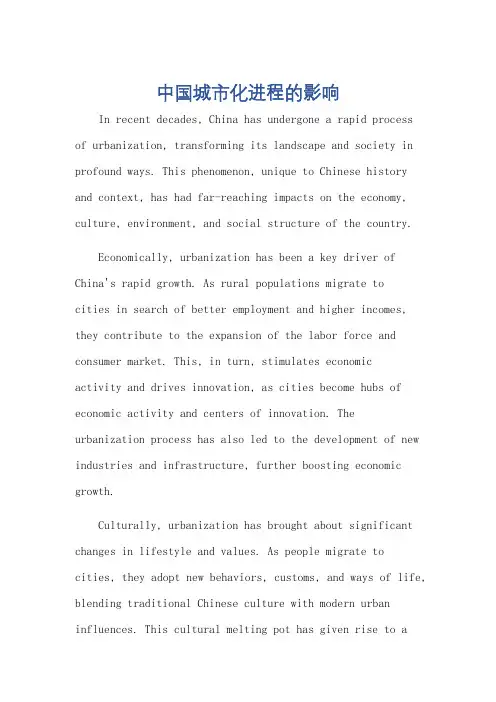
中国城市化进程的影响In recent decades, China has undergone a rapid processof urbanization, transforming its landscape and society in profound ways. This phenomenon, unique to Chinese history and context, has had far-reaching impacts on the economy, culture, environment, and social structure of the country.Economically, urbanization has been a key driver of China's rapid growth. As rural populations migrate tocities in search of better employment and higher incomes, they contribute to the expansion of the labor force and consumer market. This, in turn, stimulates economicactivity and drives innovation, as cities become hubs of economic activity and centers of innovation. Theurbanization process has also led to the development of new industries and infrastructure, further boosting economic growth.Culturally, urbanization has brought about significant changes in lifestyle and values. As people migrate tocities, they adopt new behaviors, customs, and ways of life, blending traditional Chinese culture with modern urban influences. This cultural melting pot has given rise to aunique urban culture that is both rooted in tradition and open to global influences.Environmentally, however, the rapid urbanization process has had some negative impacts. Urban sprawl has led to the loss of agricultural land and natural habitats, while air and water pollution have become serious problems in many cities. The government has responded with a series of environmental protection measures, including the promotion of green building and sustainable urban planning, to mitigate these issues.Socially, urbanization has led to the emergence of new social challenges. The influx of rural migrants to cities has created pressure on urban infrastructure and services, leading to issues such as housing shortages and uneven distribution of resources. The government has attempted to address these issues through policies such as urban planning and public housing programs, but significant challenges remain.Overall, the impact of urbanization in China has been profound and multifaceted. While it has driven economic growth and cultural innovation, it has also presentedenvironmental and social challenges that require urgent attention. As China continues to urbanize, it will be crucial to balance economic growth with environmental sustainability and social inclusivity.**中国城市化进程的影响**在过去的几十年里,中国经历了快速的城市化进程,深刻地改变了其景观和社会。
城市化造成的影响英语作文Urbanization is the process of population concentration in urban areas, leading to the growth of cities and towns. While urbanization brings about economic development and improved living standards, it also has various impacts on the environment, society, and economy.One of the most significant impacts of urbanization is increased air and water pollution. The rapid development of industries and transportation in urban areas results in higher levels of pollution, affecting the health of residents and the ecosystem. Efforts to reduce pollution through sustainable practices and green technologies are crucial in mitigating these impacts.Urbanization also leads to the loss of natural habitats and biodiversity. As cities expand, forests, wetlands, and other natural areas are often converted into residential or commercial zones, disrupting ecosystems and threatening wildlife. Conservation efforts and urban planning that prioritize green spaces are essential in preserving biodiversity in urban areas.Furthermore, urbanization can exacerbate social inequalities and create challenges such as inadequatehousing, traffic congestion, and social isolation. Providing affordable housing, improving public transportation, and promoting community engagement are important strategies to address these social impacts of urbanization.In conclusion, while urbanization brings about economic growth and opportunities, it is essential to manage its impacts on the environment, society, and economy effectively. Sustainable urban planning, environmental protection measures, and social welfare programs are key to creating livable and sustainable cities for the future.中文翻译:城市化是人口集中在城市地区的过程,导致城市和镇市的增长。
Urbanization: Its Negative ImpactsUrbanization, the process of population shift fromrural to urban areas, has been a significant trend inglobal development. While it brings numerous benefits such as economic growth, cultural diversity, and technological advancements, it also brings about numerous negative impacts. These impacts range from environmental degradation to social and cultural conflicts, all of which have the potential to hinder sustainable development.One of the most significant negative impacts of urbanization is environmental degradation. As cities expand, they often encroach upon natural habitats, leading to the loss of biodiversity and destruction of ecosystems. This destruction not only affects wildlife but also has negative consequences for human health, as it can lead to air and water pollution, as well as increased risks of natural disasters like flooding and heatwaves.Moreover, the rapid influx of people into cities often leads to overcrowding and a lack of infrastructure. Thiscan result in poor living conditions, with inadequate housing, sanitation, and transportation systems. Theseconditions can promote the spread of diseases and create a breeding ground for criminal activity, further eroding the social fabric of cities.Cultural conflicts are also a common occurrence in urbanized areas. As people from different backgrounds and cultures migrate to cities, they bring their own traditions, values, and ways of life. This diversity can lead toclashes and misunderstandings, as well as a loss ofidentity and community cohesion. Without proper integration strategies, these conflicts can lead to social tension and even violence.In addition, urbanization often results in the displacement of rural communities. As land is converted for urban use, rural residents are often forced to migrate to cities or resettle in areas with limited resources. This displacement can lead to loss of livelihoods, disruption of social networks, and a sense of displacement and marginalization.Lastly, urbanization can have negative impacts on the economy. While it can drive economic growth in the short term, it can also lead to economic disparities and socialexclusion. Urban areas often attract the most profitable and lucrative industries, while rural areas are left with less developed and less profitable sectors. This can create a divide between urban and rural areas, with the former enjoying the benefits of economic growth while the latter lag behind.In conclusion, while urbanization has brought about many positive changes, it also brings about numerous negative impacts that need to be addressed. From environmental degradation to social and cultural conflicts, these impacts have the potential to hinder sustainable development. It is therefore crucial that urban planners and policymakers take into account these impacts and work towards creating cities that are not only economically prosperous but also environmentally sustainable andsocially inclusive.**城市化:其消极影响**城市化,即人口从农村向城市地区的转移,已成为全球发展的一个重要趋势。
城市化对人们生活方式的影响英语作文The impact of urbanization on people's lifestyles is significant. As more and more people move to cities, there are several changes in how they live and interact withtheir environment.Firstly, urbanization leads to a shift in the way people work. With more opportunities for employment in cities, many individuals move from rural areas to urban centers in search of better jobs. This often results in longer working hours and a more fast-paced lifestyle, as people adapt to the demands of urban living.Secondly, urbanization also affects the way people socialize and spend their leisure time. In cities, there are more options for entertainment, such as restaurants, theaters, and shopping malls. This can lead to a more consumer-oriented lifestyle, with people spending more time and money on leisure activities.Furthermore, urbanization can also have an impact on people's health and well-being. In cities, there is often greater access to healthcare services and recreationalfacilities, leading to improved overall health for many individuals. However, urban living can also be associated with higher levels of stress and pollution, which can have negative effects on health.In conclusion, urbanization has a profound impact on people's lifestyles, influencing the way they work, socialize, and take care of their health. As more and more people around the world move to cities, it is important to consider the ways in which urbanization can affect individuals and communities.城市化对人们生活方式的影响是巨大的。
城市化带来的负面影响英语作文Urbanization, the process through which rural areas transform into urban centers, has become a defining phenomenon of the modern era. While it brings numerous advantages, such as economic growth and improved living standards, it also evokes a myriad of negative impacts that deserve serious contemplation.One of the foremost issues arising from urbanization is overpopulation. As people migrate to cities in search of better opportunities, the influx often leads to overcrowded living conditions. Inadequate housing can result in the proliferation of slums, where access to basic amenities like clean water, sanitation, and healthcare is severely limited. The strain on infrastructure not only diminishes the quality of life but also escalates socio-economic disparities among residents.Additionally, urbanization contributes significantly to environmental degradation. The rapid expansion of urban areas often leads to deforestation, loss of biodiversity, and increased pollution. Factories and vehicles contribute to air and water pollution, posing severe health risks to urban dwellers. Additionally, waste management becomes a critical challenge; cities produce vast amounts of waste, and improper disposal can lead to environmental crises, affecting both urban and surrounding rural areas.Another noteworthy negative impact is the increase in social problems. Urban areas, often seen as hubs of opportunity, can also harbor crime, violence, and unrest. The pressure of economic competition and limited jobopportunities may breed frustration, leading to higher crime rates. Furthermore, the breakdown of community bonds, common in fast-paced urban settings, can foster feelings ofisolation and mental health issues among residents.In conclusion, while urbanization plays a crucial role in the development of societies, it is vital to address the negative impacts associated with this process. To create sustainable urban environments, thoughtful planning and policies must be implemented. By focusing on affordable housing, environmental conservation, and community building, we can harness the benefits of urbanization while mitigating its detrimental effects.。
The Impact of Urbanization on MyHometownUrbanization, a process that transforms rural areasinto urban centers, has profoundly influenced my hometown. This transformation has brought about numerous changes,both positive and negative, that have impacted the lives of its residents.Firstly, the most obvious impact of urbanization has been the rapid growth in population. As people migrate to cities in search of better job opportunities and a higher quality of life, the population of my hometown hasincreased significantly. This has led to the development of new residential areas, commercial centers, andinfrastructure such as roads, hospitals, and schools. These developments have provided more convenient livingconditions and access to basic services for the residents.Secondly, urbanization has also spurred economic growth. With the influx of new residents and businesses, the economy of my hometown has diversified and expanded. New industries such as construction, manufacturing, andservices have emerged, providing job opportunities for thelocal population. This has led to an increase in income levels and a general improvement in the economic well-being of the community.However, along with the positive impacts, urbanization has also brought some negative consequences. One of the main issues is the loss of green spaces and natural habitats. As urban areas expand, they encroach on rural land, leading to the destruction of forests, wetlands, and other ecologically sensitive areas. This has had a negative impact on biodiversity and the environmental quality of the area.Another issue is the increased traffic congestion and pollution. With more people and vehicles on the roads, traffic jams have become a common occurrence. This has not only made commuting more difficult but has also contributed to air and noise pollution, affecting the health andquality of life of residents.Despite these challenges, my hometown has been able to adapt and mitigate the negative impacts of urbanization. For instance, the city has implemented sustainable development plans that prioritize environmental protectionand green infrastructure. New parks and greenbelts have been created to offset the loss of natural habitats, and sustainable transportation systems have been developed to reduce traffic congestion and pollution.In conclusion, urbanization has had a profound impact on my hometown, bringing about both positive and negative changes. While it has led to economic growth and improved living conditions, it has also caused environmental degradation and social challenges. It is important for my hometown to continue to implement sustainable development strategies that balance economic growth with environmental protection and social well-being.**城市化对我家乡的影响**城市化,即将农村地区转变为城市中心的过程,深刻地影响了我的家乡。
The influences of fast urbanizationNowadays, the urbanization is at a fast pace in our country。
It is common to see numerous people thronging into big cities and lots of skyscrapers being built every day. The main reason for this phenomenon is the urgent need of a prosperous society by almost all civilians.Undoubtedly, the fast urbanization has brought great influences on people’s daily life。
On the one hand, it has provided much convenience to people in the modern society. In recent years, the condition of people’s studying, working and living has been improved rapidly。
Therefore, a great number of people have currently lived a relatively comfortable life in big cities。
Thanks to the urbanization, it is estimated that the level of welfare and the sense of happiness of citizens has respectively risen by 40% and 50% since the implement of the reform and opening—up policy. However, on the other hand, there are also many negative effects concerning the fast urbanization。
The influences of fast urbanization
Nowadays, the urbanization is at a fast pace in our country. It is common to see numerous people thronging into big cities and lots of skyscrapers being built every day. The main reason for this phenomenon is the urgent need of a prosperous society by almost all civilians.
Undoubtedly, the fast urbanization has brought great influences on people’s daily life. On the one hand, it has provided much convenience to people in the modern society. In recent years, the condition of people’s studying, working and living has been improved rapidly. Therefore, a great number of people have currently lived a relatively comfortable life in big cities. Thanks to the urbanization, it is estimated that the level of welfare and the sense of happiness of citizens has respectively risen by 40% and 50% since the implement of the reform and opening-up policy. However, on the other hand, there are also many negative effects concerning the fast urbanization. Firstly, with more and more people being appealed to throng into big cities, they have to be faced with much more pressure with regard to living and searching jobs than previously. Secondly, the traffic problem has become so severe that the efficiency of people’s working and studying has been lowered dramatically. What’s more, there are millions of cars running on the streets and tons of factories opening every day, which has led to inevitable and damaging pollution to almost everything on earth, our
human beings involved.
From my point of view, it is reasonable for us to speed up the urbanization in order to keep pace with other developed countries. But it is worth noticing that we cannot ignore the contradiction between the growing desires and the limited resources and the balance between the nature and our human beings. After all, everything has its limits, and it’s not good to go too far. To conclude, we will surely embrace a prosperous and stable society as long as the urbanization is at a proper speed.。